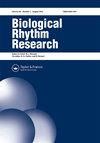COVID-19隔离期间睡眠-觉醒节律特征、时间视角和心理情绪状态的关系
IF 0.9
4区 生物学
Q3 BIOLOGY
引用次数: 5
摘要
摘要本研究旨在评估新冠肺炎隔离期间时间观、梦游节律特征和心理运动状态之间的关联。该研究于2020年4月17日至6月14日进行,涉及844名年龄在17至26岁之间的人(平均年龄:19.4±1.8岁,女性:79.4%)。每个研究参与者都填写了Zimbardo时间透视量表、慕尼黑时间类型问卷和Beck抑郁量表。隔离期间的睡眠特征发生了显著变化:睡眠时间增加了56分钟,睡眠效率下降了2.4%,睡眠阶段推迟了53分钟,而社交时差减少了77分钟。具有平衡、未来和过去积极时间观的个体具有更好的睡眠特征,不太可能出现抑郁症状。过去消极、现在享乐和现在宿命论时间观的人更有可能有更糟糕的睡眠特征,并表现出抑郁的迹象。研究结果表明,专注于长期生活规划的人通常更容易忍受新冠肺炎隔离。本文章由计算机程序翻译,如有差异,请以英文原文为准。
Associations among sleep-wake rhythm characteristics, time perspective and psycho-emotional state during COVID-19 isolation
ABSTRACT The aim of this study is to evaluate the associations among time perspective, sleep-wake rhythm characteristics, and psycho-emotional state during COVID-19 isolation. The study was carried out from April 17 to 14 June 2020and involved 844 people aged 17 to 26 years (average age: 19.4 ± 1.8 years, women: 79.4%). Each study participant filled out the Zimbardo Time Perspective Inventory, the Munich ChronoType Questionnaire, and Beck Depression Inventory. There were significant changes in the sleep characteristics during isolation: sleep duration increased by 56 minutes, sleep efficiency decreased by 2.4%, sleep phase delayed by 53 minutes, while social jetlag decreased by 77 minutes. Individuals with balanced, future, and past positive time perspective had better sleep characteristics, and were less likely to exhibit symptoms of depression. Persons with past negative, present hedonistic and present fatalistic time perspective were more likely to have worse sleep characteristics, and exhibited signs of depression. The results of the study indicate that persons focused on long-term planning for their lives generally endured the COVID-19 isolation more easily.
求助全文
通过发布文献求助,成功后即可免费获取论文全文。
去求助
来源期刊

Biological Rhythm Research
生物-生理学
CiteScore
3.00
自引率
9.10%
发文量
34
审稿时长
6-12 weeks
期刊介绍:
The principal aim of Biological Rhythm Research is to cover any aspect of research into the broad topic of biological rhythms. The area covered can range from studies at the genetic or molecular level to those of behavioural or clinical topics. It can also include ultradian, circadian, infradian or annual rhythms. In this way, the Editorial Board tries to stimulate interdisciplinary rhythm research. Such an aim reflects not only the similarity of the methods used in different fields of chronobiology, but also the fact that many influences that exert controlling or masking effects are common. Amongst the controlling factors, attention is paid to the effects of climate change on living organisms. So, papers dealing with biometeorological aspects can also be submitted.
The Journal publishes original scientific research papers, review papers, short notes on research in progress, book reviews and summaries of activities, symposia and congresses of national and international organizations dealing with rhythmic phenomena.
 求助内容:
求助内容: 应助结果提醒方式:
应助结果提醒方式:


